April is Earth Month, including Earth Day on Tuesday, April 22. It is more important than ever to learn about the Earth, climate and sustainability. This list is just a sample of the books the Libraries has relating to these topics. Check out the Sustainability Hub in the Science Library for an entire collection of books about the environment and humans’ effect on it. This list includes diverse perspectives, emphasizing who is affected the most by environmental degradation including Indigenous people, people of color, people with low income and people in less industrially developed countries. Dive into our amazing collection of books and learn about environmental justice, environmental intersectionality, what you can do and more!
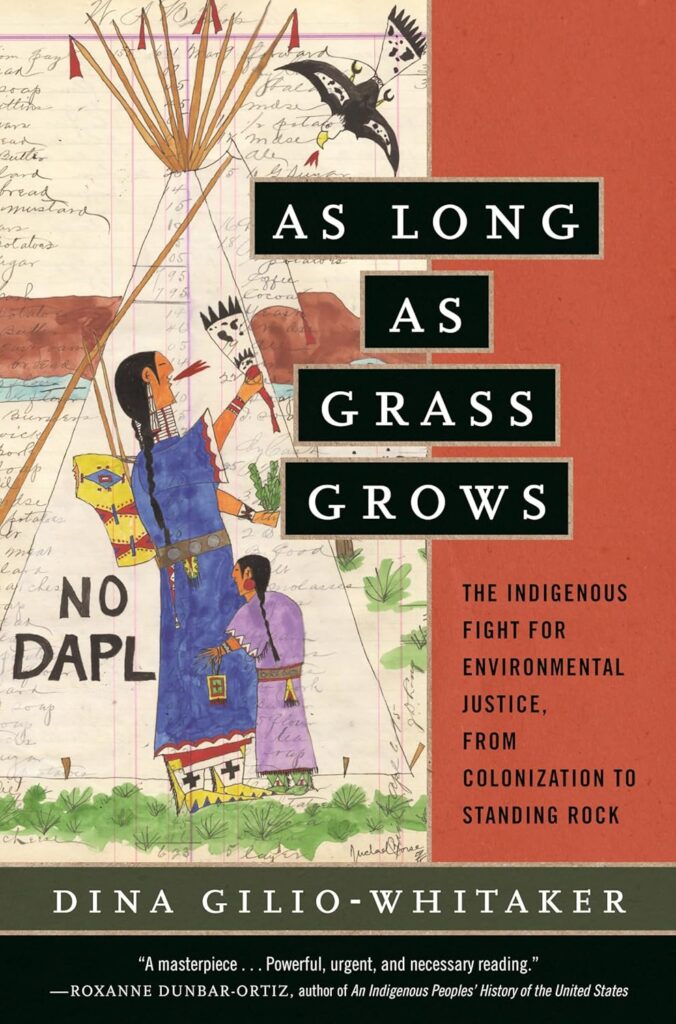
As long as grass grows: the indigenous fight for environmental justice, from colonization to Standing Rock
by Dina Gilio-Whitaker
Interrogating the concept of environmental justice in the U.S. as it relates to Indigenous peoples, this book argues that a different framework must apply compared to other marginalized communities, while it also attends to the colonial history and structure of the U.S. and ways Indigenous peoples continue to resist, and ways the mainstream environmental movement has been an impediment to effective organizing and allyship.
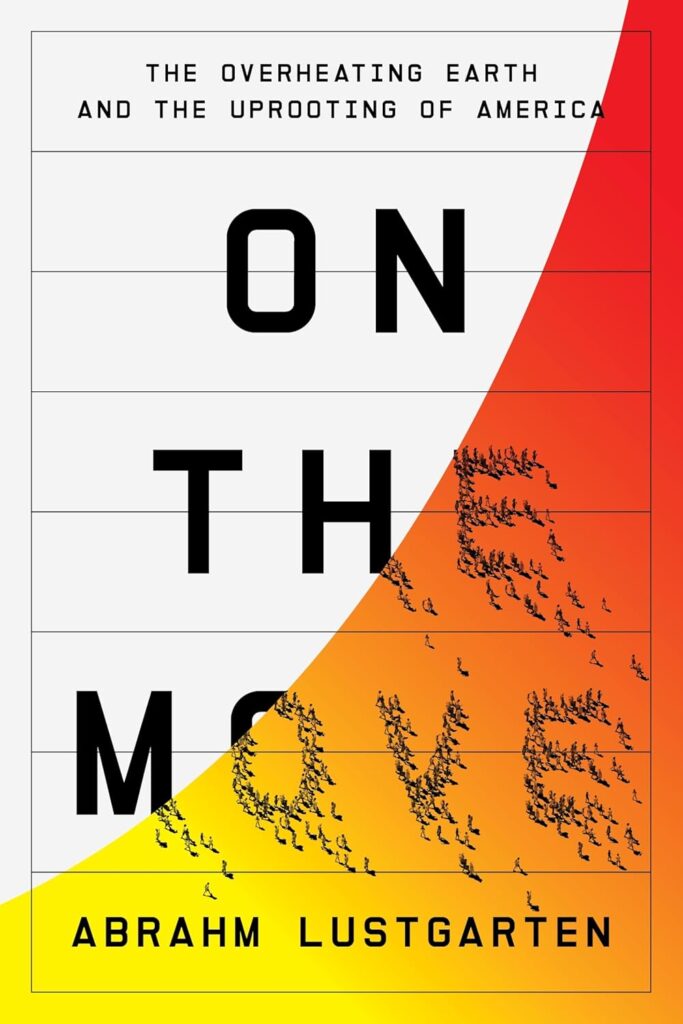
On the move: the overheating earth and the uprooting of America
by Abrahm Lustgarten
A vivid, journalistic account of how climate change will make American life as we know it unfeasible. Humanity is on the precipice of a great climate migration, and Americans will not be spared. Tens of millions of people are likely to be driven from the places they call home. Poorer communities will be left behind, while growth will surge in the cities and regions most attractive to climate refugees. America will be changed utterly. Abrahm Lustgarten’s On the Move is the definitive account of what this massive population shift might look like. As he shows, the United States will be rendered unrecognizable by four unstoppable forces: wildfires in the West; frequent flooding in coastal regions; extreme heat and humidity in the South; and droughts that will make farming all but impossible across much of the nation. Reporting from the front lines of climate migration, Lustgarten explains how a pattern of shortsighted policies encouraged millions to settle in vulnerable parts of the country, and introduces us to homeowners in California, insurance customers in Florida, and ranchers in Colorado who are being forced to make the agonizing choice of when, not whether, to leave. Employing the most current climate data and predictive models, he shows how America’s population will be squeezed northward into a shrinking triangle of land stretching from Tennessee to Maine to the Great Lakes. The places many of us now call home are at risk, and On the Move reveals how we’ll deal with the consequences.

Climate change is racist: race, privilege and the struggle for climate justice
by Jeremy Williams
When we talk about racism, we often mean personal prejudice or institutional bias. Climate change isn’t racist in that way. It is structurally racist, disproportionately caused by majority White people in majority White counties, with the damage unleashed overwhelmingly on people of colour. In this eye-opening book, writer and environmental activist Jeremy Williams takes us on a short, urgent journey across the globe–from Kenya to India, the USA to Australia–to understand how White privilege and climate change overlap. We’ll look at the environmental facts, hear the experiences of the people most affected on our planet and learn from the activists leading the charge.
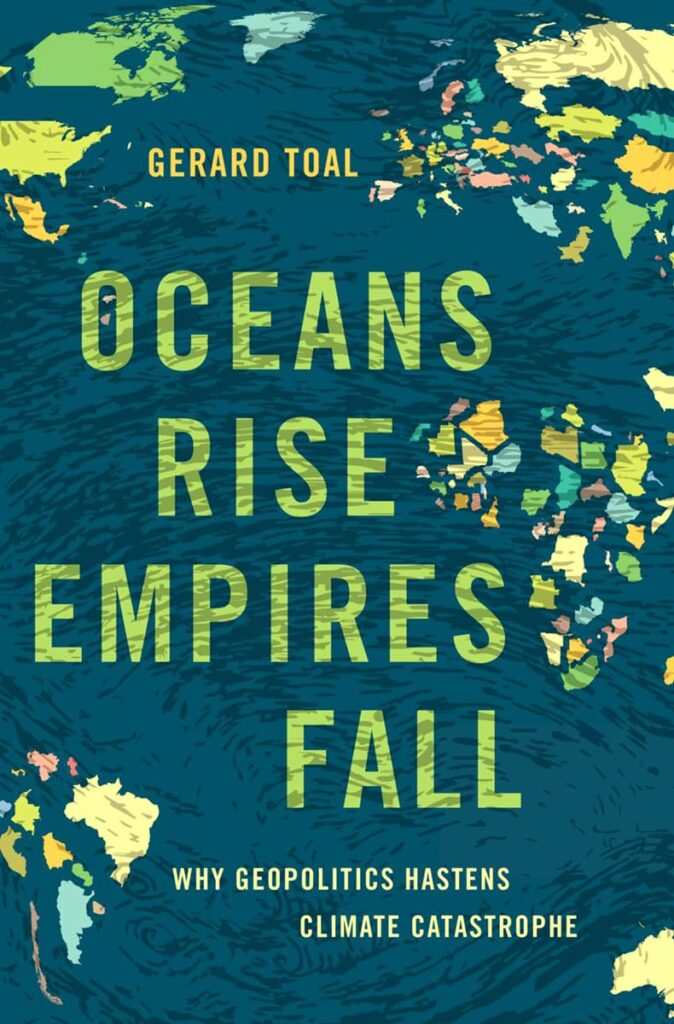
Oceans rise empires fall: why geopolitics hastens climate catastrophe
by Gerard Toal
Oceans Rise Empires Fall: Why Geopolitics Hastens Climate Change discusses how geopolitics affects climate change by highlighting its catastrophic effects. Even though states would prefer to reduce emissions in the abstract, they would always prioritize access to carbon-based fuels necessary for generating economic growth to compete with rival states. Thus, geopolitical competition ramps the difficulty of implementing effective climate change policies. Oceans Rise Empires Fall discusses how the Ukraine and Russia conflict exposed priorities such as territorial control and fossil fuel acquisition over a zero-carbon future. It explains that competitive territorial, resource, and technological dramas obscured the deterioration of the planet’s life support systems.
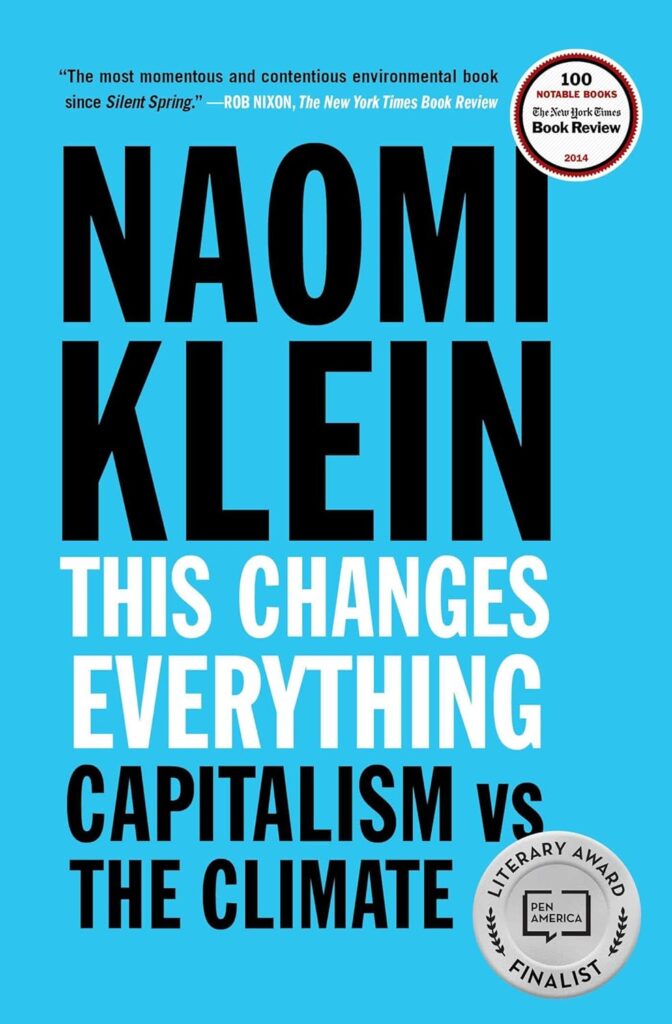
This changes everything: capitalism vs. the climate
by Naomi Klein
The most important book yet from the author of the international bestseller The Shock Doctrine, a brilliant explanation of why the climate crisis challenges us to abandon the core “free market” ideology of our time, restructure the global economy, and remake our political systems. In This Changes Everything Naomi Klein argues that climate change isn’t just another issue to be neatly filed between taxes and health care. It’s an alarm that calls us to fix an economic system that is already failing us in many ways. Klein meticulously builds the case for how massively reducing our greenhouse emissions is our best chance to simultaneously reduce gaping inequalities, re-imagine our broken democracies, and rebuild our gutted local economies. She exposes the ideological desperation of the climate-change deniers, the messianic delusions of the would-be geoengineers, and the tragic defeatism of too many mainstream green initiatives. And she demonstrates precisely why the market has not–and cannot–fix the climate crisis but will instead make things worse, with ever more extreme and ecologically damaging extraction methods, accompanied by rampant disaster capitalism.
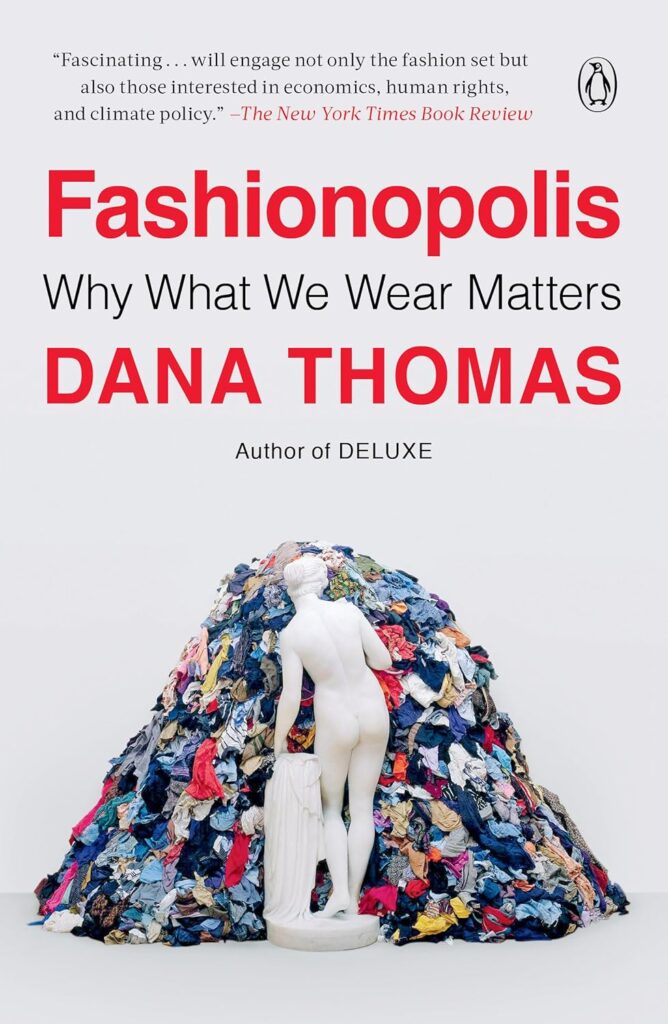
Fashionopolis: why what we wear matters
by Dana Thomas
What should I wear? It’s one of the fundamental questions we ask ourselves every day. More than ever, we are told it should be something new. Today, the clothing industry churns out 80 billion garments a year and employs every sixth person on Earth. Historically, the apparel trade has exploited labor, the environment, and intellectual property—and in the last three decades, with the simultaneous unfurling of fast fashion, globalization, and the tech revolution, those abuses have multiplied exponentially, primarily out of view. We are in dire need of an entirely new human-scale model. Bestselling journalist Dana Thomas has traveled the globe to discover the visionary designers and companies who are propelling the industry toward that more positive future by reclaiming traditional craft and launching cutting-edge sustainable technologies to produce better fashion.
In Fashionopolis, Thomas sees renewal in a host of developments, including printing 3-D clothes, clean denim processing, smart manufacturing, hyperlocalism, fabric recycling—even lab-grown materials. From small-town makers and Silicon Valley whizzes to such household names as Stella McCartney, Levi’s, and Rent the Runway, Thomas highlights the companies big and small that are leading the crusade.
We all have been casual about our clothes. It’s time to get dressed with intention. Fashionopolis is the first comprehensive look at how to start.
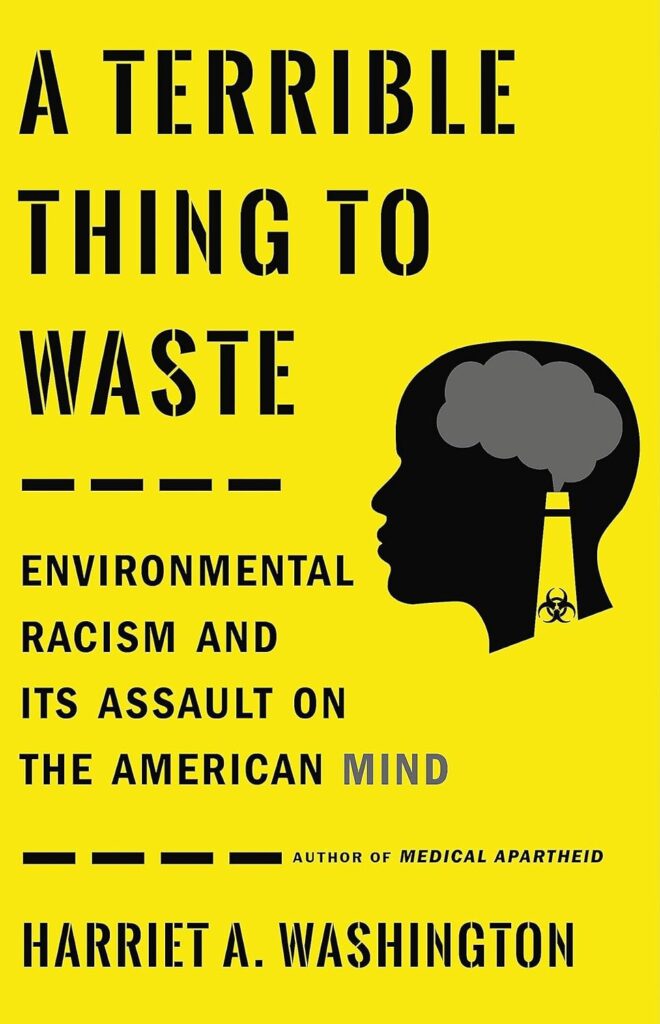
A terrible thing to waste : environmental racism and its assault on the American mind
by Harriet A. Washington
From injuries caused by lead poisoning to the devastating effects of atmospheric pollution, infectious disease, and industrial waste, Americans of color are harmed by environmental hazards in staggeringly disproportionate numbers. This systemic onslaught of toxic exposure and institutional negligence causes irreparable physical harm to millions of people across the country–cutting lives tragically short and needlessly burdening our health care system. But these deadly environments create another insidious and often overlooked consequence: robbing communities of color, and America as a whole, of intellectual power. The 1994 publication of The Bell Curve and its controversial thesis catapulted the topic of genetic racial differences in IQ to the forefront of a renewed and heated debate. Now, in A Terrible Thing to Waste, award-winning science writer Harriet A. Washington adds her incisive analysis to the fray, arguing that IQ is a biased and flawed metric, but that it is useful for tracking cognitive damage. She takes apart the spurious notion of intelligence as an inherited trait, using copious data that instead point to a different cause of the reported African American-white IQ gap: environmental racism–a confluence of racism and other institutional factors that relegate marginalized communities to living and working near sites of toxic waste, pollution, and insufficient sanitation services. She investigates heavy metals, neurotoxins, deficient prenatal care, bad nutrition, and even pathogens as chief agents influencing intelligence to explain why communities of color are disproportionately affected–and what can be done to remedy this inequity.
Book descriptions based on publisher information






